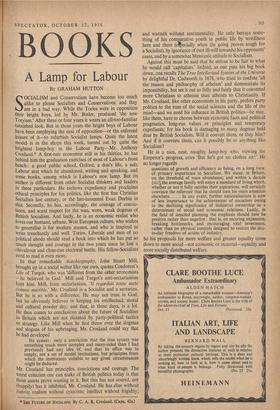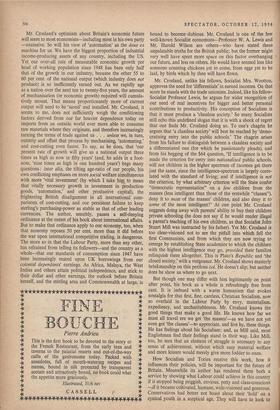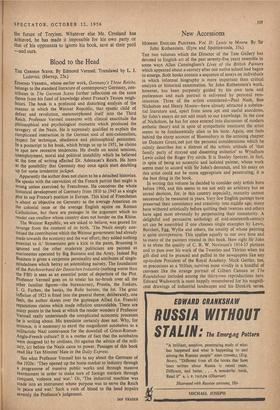BOOK
A Lamp for Labour
BY GRAHAM HUTTON SOCIALISM and Conservatism have become too much alike to please Socialists and Conservatives; and they are in a bad way. While the Tories were in opposition their bright boys, led by Mr. Butler, produced 'the new Toryism.' After three or four years it wears an all-too-familiar tarnished look. But in those years the bright boys of Labour have been employing the ease ,of opposition—or the enforced leisure of it—to refurbish Socialist lamps. Quite the latest model is in the shops this week, turned out by quite the brightest lamp-boy in the Labour Party—Mr. Anthony Crosland.* A first-rate economist still in his thirties, he has behind him the graduation exercises of most of Labour's front bench : a good public school, Oxford, a don's life, a safe Labour seat which he abandoned, writing and speaking, and some books, among which is Labour's new lamp. But its author is different from other Socialist thinkers and leaders in three particulars. He eschews expediency and proclaims ethical principles for his politics, like the first fine Christian Socialists last century, or thd late-lamented Evan Durbin in this. Secondly, he has, accordingly, the courage of convic- tions, and scant respect for the wan, worn, weak dogmas of British Socialism. And lastly, he is an economic realist who loves our humane, urbane, West European culture, who wishes to generalise it for modern masses, and who is inspired to write trenchantly and well. Tories, Liberals and men of no Political abode should read a book into which he has put so much thought and courage in the two years since he lost a chivalrous and close-run electoral battle. His fellow-Socialists need to read it even more.
In that remarkable Autobiography, John Stuart Mill, brought up in a social welter like our own, quotes Condorcet's Life of Turgot, who was 'different from the other economists —he believed in God.' Mill said Turgot's anti-sectarianism kept him, Mill, from sectarianism. I/ regardait toute secte comme nuisible.' Mr. Crosland is a Socialist and a sectarian. But he is so with a difference. He may not trust in God; but he obviously believes in keeping his intellectual, moral and cultural powder dry; and that, in these days, is a lot. He thus comes to conclusions about the future of Socialism in Britain which are not dictated by party-political tactics or strategy. Like Mill when he first threw over the dogmas and slogans of his upbringing, Mr. Crosland could say that he had developed
No system : only a conviction that the true system was
something much more complex and many-sided than I had previously had any idea of, and that its office was to supply, not a set of model institutions, but principles from which the institutions suitable to any given circumstances might be deduced.
Mr. Crosland has principles, convictions and courage. The worst criticism one can make of British politics today is that these assets prove wasting in it. But this has not soured, nor (happily) has it inhibited, Mr. Crosland. He has elan without hubris; 'realism without cynicism; intellect without frigidity; * Tus Pumas OF .SOCIALISM. By C. A. R. Crosland. (Cape, 42s.) and warmth without sentimentality. He only betrays some- thing of his corn arative youth in public life by wordiness here and there (e ecially when the going proves tough for a Socialist), by ignorance of (not towards) his opponents' cases, and by a somewhat Messianic attitude to Socialism.
Against this must be said that he strives to be fair to what he would call 'capitalists.' Indeed, as one puts his big book down, one recalls The True Intellectual System of the Universe by delightful IN. Cudworth in 1678, who tried to confute 'all the reason and philosophy of atheism' and demonstrate its impossibility, but set it out so fully and fairly that it converted more Christians to atheism than atheists to Christianity. if Mr. Crosland, like other economists in his party, prefers party politics to the ease of the social sciences and the life of the mind—and we need his influence in British politics—he may. like them, have to choose between economic facts and political pragmatics, long-run values or principles and temporary expedients; for his book is damaging to many dogmas held dear by British Socialists. Will it convert them, or they him? And if it converts them, can it possibly be to anything like Socialism?
He is a nice, neat, naughty lamp-boy who, viewing the Emperor's progress, cries 'But he's got no clothes ,on !' He no longer regards questions of growth and efficiency as being, on a long view, of primary importance to Socialism. We stand, in Britain. on the threshold of mass abundance; and within a decade [sic!] the average family will enjoy a standard of living which. whether or not it fully satisfies their aspirations, will certainly convince the reformer that he should turn his main attention elsewhere. . . . In any event, further nationalisation is now of less importance to the achievement of socialism owing to the declining significance of industrial ownership as a determinant of social and economic relations. Lastly, in the field of detailed planning the emphasis should now be positive rather than negative : that is, on securing expansion, breaking bottlenecks, and encouraging vital investment, rather than on physical controls designed to restrict the day-
to-day freedom of action of industry.
So his proposals for more welfare and greater equality come down to more social—not economic or material—equality and more socially distributed welfare. Mr. Crosland's optimism about Britain's economic future will seem to most economists—including most in his own party —excessive. So will his view of 'automation' as the deus ex machina for us. We have the biggest proportion of industrial income-producing assets of any country, including the US. Yet our over-all rate of measurable economic growth per head of working population since 1948 has been only half that of the growth in our industry, because the other 55 to 60 per cent. of the national output (which industry does not produce) is so inefficiently turned out. As we rapidly age as a nation over the next ten to twenty-five years, the amount of mechanisation (or economic growth) required will cumula- tively mount. That means proportionately more of current output will need to be 'saved' and installed. Mr. Crosland, it seems to me, does not sufficiently weigh the conditioning factors derived from our far heavier dependence today on imports from an outside world ever more able to consume raw materials where they originate, and therefore increasingly turning the terms of trade against us . . . unless we, in turn, outstrip and offset that process by mechanising,. 'automating,' and cost-cutting even faster. To say, as he does, that 'our present rate of growth will give us a national output three times as high as now in fifty years' (and, he adds in a foot- note, 'nine times as high in one hundred years') begs many questions : inter alia, the tilting age-ratio of our people, his own conflicting emphases on more social welfare simultaneous with more 'vital investment' (by which I take him to mean that vitally necessary growth in investment in production goods, 'automation,' and other productive capital), the frightening British disalignment in all international com- parisons of cost-cutting, and our persiitent failure to keep sterling's purchasing-power as stable as that of other leading currencies. The author, sensibly, passes a self-denying ordinance at the outset of his book about international affairs. But to make that ordinance apply to our economy, too, when that economy reposes 50 per cent. more than it did before the war upon international competitive trading, is dangerous. The more so in that the Labour Party, more than any other, has refrained from telling its followers—and the country as a whole—that our standards of consumption since 1947 have been increasingly reared upon UK borrowings from our colonial dependants' earnings. As Africa, Malaya, the West Indies and others attain political independence, and stick to their dollar and other earnings, the outlook before Britain herself, and the sterling area and Commonwealth at large, is bound to become'.dubious. Mr. Crosland is one of the few well-known Socialist economists—Professor W. A. Lewis and Mr. Harold Wilson are others—who have stated these unpalatable truths for the British public; but the former might very well have spent more space on this factor overhanging our future, and less on others. He would have seemed less like someone counting chickens yet to come, from eggs yet to be laid, by birds which by then will have flown.
Mr. Crosland, unlike his fellows, Socialist Mrs. Wootton, approves the need for 'differentials' in earned incomes. On that score he stands with the trade unionists. Indeed, like his fellow- Socialist Professor Lewis, he argues for wider recognition of our need of real incentives for bigger and better personal contributions to productivity. His conception of Socialism is that it must produce a 'classless society.' So many Socialists still echo this undefined slogan that it is with a shock of regret that one finds Mr. Crosland doing so. To one's chagrin he argues that 'a classless society' will best be reached by 'demo- cratising entry into the public schools.' The chagrin arises from his failure to distinguish between a classless society and a differentiated one (for which he passionately pleads), and from his begging of the $64 question, 'If intelligence is to be made the criterion for entry into nationalised public schools, will not children in the higher spectrum of incomes get there just the same, since the intelligence-spectrum is largely corre- lated with the standard of living; and if intelligence is not the criterion, by what arbitrary criterion will the State confer "democratic representation" on a few children from the masses (less intelligent than those of the erstwhile "classes"), deny it to most of the masses' children, and also deny it to some of the most intelligent?' At one point Mr. Crosland suggests doing away with parents' ability to buy their children private schooling (he does not say if he would render illegal a parent's teaching of his own children, as that Socialist John Stuart Mill was instructed by his father). Yet Mr. Crosland is too clear-visioned not to see the pitfall into which fell the first Communists, and from which they are now trying to emerge by establishing State academies to which the children with the highest intelligence may go, provided their families relinquish them altogether. This is Plato's Republic and 'the closed society,' with a vengeance. Mr. Crosland shows masterly brinkmanship on this perilous col. He doesn't slip; but neither does he show us where to go next.
But though one may differ with him legitimately on point after point, his book as a whole is refreshingly free from cant. It is imbued with a warm humanism that evokes nostalgia for that first, fine, careless, Christian Socialism, now so overlaid in the Labour Party by envy, materialism, expediency, and uncharitableness. Mr. Crosland knows the good things that make a good life. He knows how far we must all travel ere we get 'the masses'—as we have not yet even got 'the classes'—to appreciate, and live by, these things. He has feelings about his Socialism; and, as Mill said, most Englishmen find their feelings stand in their way. Like Mill, too, he sees that an element of struggle is necessary to any sense of achievement, without which easy material welfare and more leisure would merely give more fodder to oxen.
How Socialists and Tories receive this work, how it influences their policies, will be important for the future of Britain. Meanwhile its author has rendered them both a service by showing what Labour could achieve in this country if it stopped being priggish, envious, petty and class-conscious if it became cultivated, humane, wide-visioned and generous. Conservatives had better not boast about their 'hold' on a cynical youth in a sceptical age. They will have to look to the future of Toryism. Whatever else Mr. Crosland has achieved, he has made it impossible for his own party or that of his opponents to ignore his book, save at their peril —and ours.












































 Previous page
Previous page